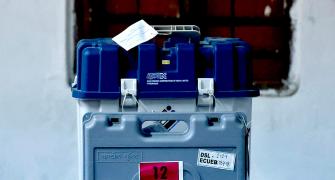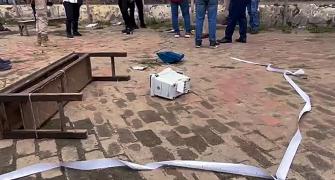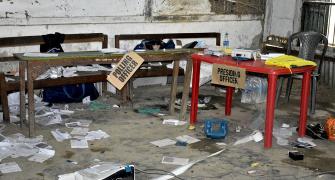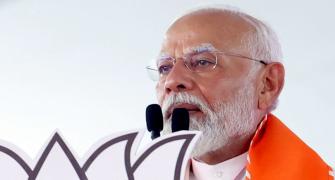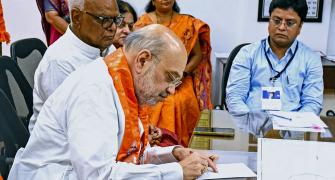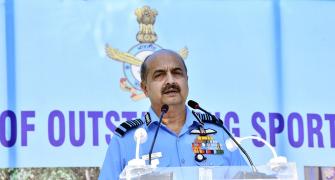With nail biting suspense mounting each second, and the bid for Mahatma Gandhi's seven items belonging to soaring from $ 20,000 to $1 million in less than half a minute, the plush room at the prestigious New York auction house awaited the outcome of a much reported and hotly disputed auction. It would take about 20 minutes before the final bid of $1.8 million brought the items into the possession of Vijay Mallya, the billionaire chairman of United Breweries Group and Kingfisher Airlines.
Mallya said through his representative at the auction that he would donating the items including a Zenith watch and a pair of sandals to the Navajivan Trust established by the Mahatma. Among the items were the plate and the bowl in which Gandhi ate his last meal before his assassination in 1948.
"I am sure all Indians will be pleased that these Gandhi items will be coming home," Tony Bedi, who bid at the auction on Mallya's behalf, declared "He was bidding for the country."
Bedi insisted that the auction involved something much more than money and those were Mallya's feelings too. "Gandhi is not about money but about peace," Bedi said.
But money was on the mind of many reporters. Bloomberg News said that with commissions, the winning bidder will pay $ 2.1 million for the items. And it quoted Forbes Magazine which said last year that Mallya's net worth plunged to $390 million in November 2008 from $1.6 billion in 2007.
The news of the auction had created a stir in India; there was also some dismay that a relative of the Mahatma had sold the items to a German business and the items had come into the possession of James Otis, a Los Angeles based Gandhian. But some people also wondered why Gandhi's family and the Indian government or the Navajivan Trust had not made an attempt to bring the items back to India over the last four decades. The controversy could further continue given Mallya's reputation as a liquor baron and Gandhi's steadfast opposition to alcohol.
Adding to the drama of the auction, Otis, met with the reporters outside the building housing Antiquorum auctioneers in Madison Avenue and announced that he had wanted the auction be called off and that he had written to the auction house. Otis also sent his pro-bono lawyer Ravi Batra to meet with Robert Maron, the chairman of the auction house. Otis said he did not like the controversy that had been brewing for many days. "I pray that the outcome is positive and one that Gandhi would approve of," Otis said. He also said, without giving details, he would to begin 23-day long fast 'to contemplate his actions.' He said he would give back the items to the Navjivan Trust.
After the auction Otis had a change of heart. He said through Batra he was glad the auction had won 'by a reputable person who intended to return them to India and that he would ratify the auction.' Batra said he had no idea how much of the $1.8m Otis would collect or give to pacifist organizations.
"But I find my client to be a very honorable person, and though he is glad that the items are going back to India to be displayed in public, he still thinks he has to go on a fast because he had created controversies and angered people without meaning to do so," Batra said.
The items would be handed over to the successful bidder only after two weeks, Maron said on Thursday evening soon after the auction was over. Before the auction started it was announced that the US Department of Justice had asked the auction house to retain the items for two weeks so that the ownership issues were resolved.
The Department was responding to New Delhi High Court's injunction against the auction. The Trust had claimed that Gandhi's items, which were reportedly sold by a descendant to a German businessmen and then came into the position of Otis, were taken illegally from India.
With so many disputes going on, there was no sign that the auction would be delayed or stopped.
The auction began with a two minute showing of images from Gandhi's life.
The room was filled with more journalists than bidders. There were reporters from Aljazeera to Voice of America to British Broadcasting Corporation.
As the bidding soared beyond $1 million, there were just two bidders: an absentee bidder, whose name was not disclosed and Tony Bedi.
Bedi, wearing a white turban, was sitting next to the hotelier Sant Singh Chatwal, wearing a red turban.
The bid soared to $1.7 million and it looked like the other bidder won. Then Bedi, who was in touch with Mallya through the phone, made a tiny signal, the price went to $1.8 million and within a seconds the auction was over.
Antiquorum, one of the best known wrist-watch auctioneer established the all-time world record price for a wristwatch at auction when it sold a platinum Patek Philippe from 1939 for 4,026,524 seven years ago. Several bidders at the Gandhi auction said the price fetched for his belongings was indeed very impressive.
But a lot of question remained.
What didn't Sant Singh Chatwal, who had strode into the building with over a dozen cameras capturing images of him holding the auction catalogue, bid? Just yesterday Chatwal had said he was making a serious bid with a handful of fellow Indian Americans, to buy the items and donate them to India.
A few minutes before the auction started, he said: "These items belong to India, and I wish they were not auctioned but the owner did not want to give them away free, but there are people like me here today who want to ensure that they are returned to India."
Chatwal added: "Mahatma Gandhi is the father of India, and we owe to India that his belongings are returned to India."
Chatwal said after the auction that he was all prepared to join the bidding but after he had got a call from Mallya on March 4, a day before the event, he changed his mind.
"Vijay wanted to know if I was going to bid and I said I would," Chatwal said. "As I chatted with him it was clear to me that he too wanted to donate the items to the Navjivan Trust. I then decided I would not bid.
"Both of us wanted to do the same thing, and there was no question of ego. But I decided to be at the bidding, in case Mallya decided against joining the auction."
Chatwal also said that Mallya and he agreed that it was imperative that an Indian who was prepared to return the items to India free of cost should be the winner.
Not many people at the auction knew there was also a mysterious bidder ready to tear into the proceedings if Mallya backed out or stopped bidding if the price soared beyond his expectations. Prabhu Dayal, the Indian consul general, said without revealing the person's name that the mysterious bidder was also representing several Indians. "He was prepared to go to the very end," Dayal said.
The Indian consulate or representatives of the Indian government cannot comment on the decision of the New Delhi High Court which wanted the auction to be delayed, if not stopped, he said. "We will be held in contempt of the court if we said anything against the court's decision," he continued. "When people like Sant Singh Chatwal wanted to do the bidding, we wished them well. We did not want to go beyond that."
He said The High Court decision was conveyed by the Indian embassy to the State Department a few days before the auction.
A few days earlier, Otis had said he has been disappointed at the reaction of some Indians and the Indian media, and at being made to look like a thief. And he has not hidden what he calls his utter disappointment that the Indian government refused to take his offer of giving the merchandise to India at no cost provided India improved health care for the indigent.
But Anand Sharma, India's junior foreign minister, was quoted in the newspapers as saying the government could not 'enter into such agreements where it involves specific areas of allocation of resources.'.
Maron, the auction house chairman refused to acknowledge that Mallya had won the bidding. Talking to reporters after the auction was over he said the successful bidder was a "person of excellent integrity" and had committed to give back "Gandhiji's possessions to India to be displayed in the public." Dayal said that Mallya had given such an assurance to the Indian officials as well as Chatwal.
But when Bedi, who lives on the West Coast turned up for the auction, he reportedly remained silent about the items going to the Trust.
"We did not know him and I got worried," Dayal said. But with Chatwal by Bedi's side, the issue was hammered out within a few minutes, he added. "He assured us Mallya will be standing by his word."


